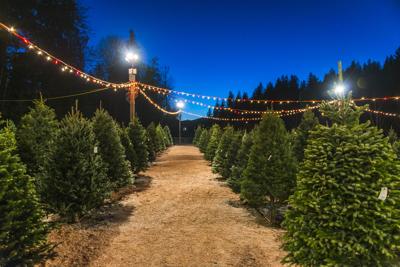Decades before Darwin visited the Galapagos Islands, a Scottish botanist trekking the Appalachian forests of Tennessee and North Carolina collected and, later, introduced the native fir that still bears his name.
John Fraser didn’t live long enough to see his “discovery” become one of the most popular Christmas trees in America. In fact, he likely never heard of the idea of decorating a tree to celebrate the season.
The beloved “Fraser fir” Abies fraseri that dominates Franklin’s Christmas tree lots is native to the Appalachian highlands John Fraser walked. Occurring at elevations of approximately 4,000 to 6,000 feet, Frasers have long been important members of our boreal community. They’re an excurrent grower, capable of reaching 50 feet in height or more and, yes, wild firs fill the forests with that same heavenly scent they bring into your home.
Over the last hundred years or so, our wild Frasers— or “She-balsams” as mountain folks called them— have been devastated by the balsam wooly adelgid (BWA), an accidentally introduced pest. A hike through the carcasses of upper elevation old growth forests in the Great Smokies will make the tragedy real. Things are sad, but not hopeless. Many trees survive to reproductive years and some longer. Arboriculturists are at work on solutions.
And, of course, Christmas tree farmers in the North Carolina, Virginia and Tennessee mountains continue to cultivate our favored tree that decorates so well, holds it needles so long, and produces that iconic fragrance of the season. One day, I hope, BWA will be a benign pest in our fir/spruce forests. In the meantime, whether it’s a Christmas tree or shade planting for your back lawn, think natives first! Protecting the value of our native forests is one of the most important things we can do to ensure they will still be here for our grandchildren’s grandchildren.
Dr. Ernie Reynolds’ award-winning work is enjoyed in public and private gardens throughout Middle Tennessee and beyond. His firm, Holly Consults, represents residential and commercial clients as managers of landscape and exterior construction projects of all sizes and complexities. He can be reached ereynolds@hollyconsults.com.


(0) comments
Welcome to the discussion.
Log In
Keep it Clean. Please avoid obscene, vulgar, lewd, racist or sexually-oriented language.
PLEASE TURN OFF YOUR CAPS LOCK.
Don't Threaten. Threats of harming another person will not be tolerated.
Be Truthful. Don't knowingly lie about anyone or anything.
Be Nice. No racism, sexism or any sort of -ism that is degrading to another person.
Be Proactive. Use the 'Report' link on each comment to let us know of abusive posts.
Share with Us. We'd love to hear eyewitness accounts, the history behind an article.